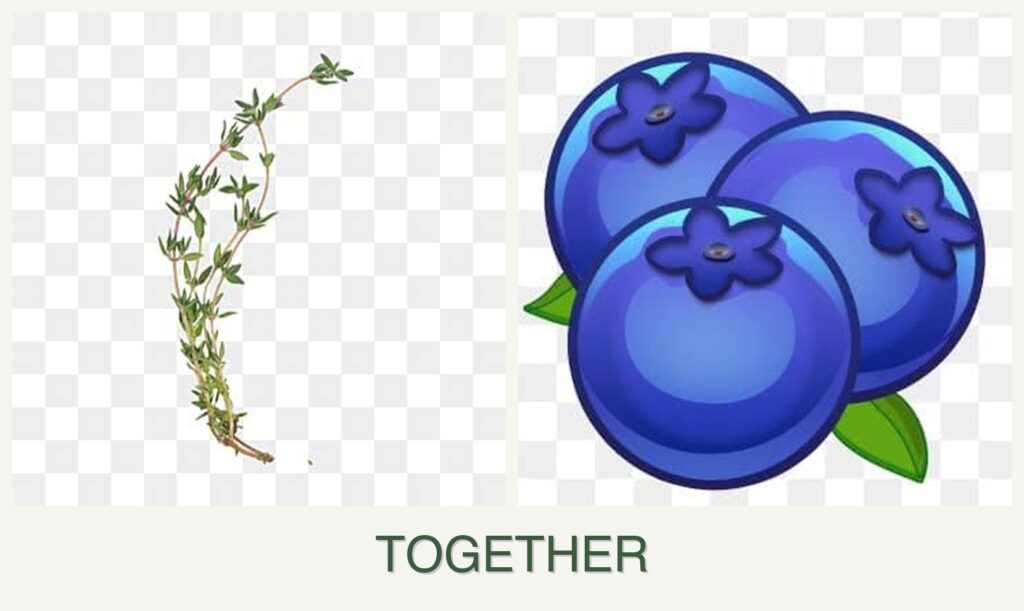
Can you plant thyme and blueberries together?
Can You Plant Thyme and Blueberries Together?
Companion planting is a popular method among gardeners to enhance plant growth, deter pests, and maximize space. In this article, we explore whether thyme and blueberries make good companions, and what you need to know to successfully grow them together.
Compatibility Analysis
Can you plant thyme and blueberries together? The answer is generally NO. While both plants are valuable additions to a garden, their differing growth requirements make them less compatible as companions. Blueberries thrive in acidic soil with a pH of 4.5 to 5.5, whereas thyme prefers neutral to slightly alkaline soil with a pH of 6.0 to 8.0. This fundamental difference in soil pH makes it challenging to meet the needs of both plants simultaneously.
Key Factors
- Growth Requirements: Blueberries require consistently moist, well-drained soil, while thyme is drought-tolerant and prefers drier conditions.
- Pest Control: Thyme is known for its pest-repellent properties, which could benefit blueberries if grown nearby but not in the same soil.
- Nutrient Needs: Blueberries need a more acidic environment to access nutrients effectively, which thyme does not require.
- Spacing: Blueberries are larger shrubs that need more space compared to the compact growth habit of thyme.
Growing Requirements Comparison Table
| Factor | Blueberries | Thyme |
|---|---|---|
| Sunlight Needs | Full sun | Full sun to partial shade |
| Water Requirements | Consistent moisture | Low to moderate |
| Soil pH and Type | Acidic (4.5-5.5) | Neutral to alkaline (6.0-8.0) |
| Hardiness Zones | 3-8 | 5-9 |
| Spacing Requirements | 4-5 feet apart | 12-18 inches apart |
| Growth Habit | Shrub (3-6 feet) | Herb (6-12 inches) |
Benefits of Planting Together
While planting thyme and blueberries directly together is not recommended due to their soil pH incompatibility, there are still benefits to having them in the same garden area:
- Pest Repellent Properties: Thyme can deter certain pests, potentially benefiting nearby blueberry plants.
- Pollinator Attraction: Both plants attract bees and other pollinators, enhancing garden biodiversity.
- Space Efficiency: Thyme can be planted in nearby beds or containers, making efficient use of garden space.
Potential Challenges
- Resource Competition: Different water and nutrient needs could lead to competition if planted too closely.
- Disease Susceptibility: Blueberries require specific soil conditions to avoid diseases, which thyme’s preferred conditions do not support.
- Harvesting Considerations: Harvesting blueberries may be complicated if thyme is planted too closely.
- Practical Solutions: Use separate containers or garden beds with tailored soil conditions for each plant.
Planting Tips & Best Practices
- Optimal Spacing: Ensure at least 4-5 feet between blueberry bushes and thyme plants.
- Timing: Plant blueberries in early spring, and thyme after the last frost.
- Container vs. Garden Bed: Consider using containers for thyme to control soil pH.
- Soil Preparation: Amend soil with sulfur for blueberries to maintain acidity.
- Companion Plants: Consider planting thyme with other herbs like rosemary or lavender, which share similar soil preferences.
FAQ Section
-
Can you plant thyme and blueberries in the same pot?
No, due to differing soil pH requirements. -
How far apart should thyme and blueberries be planted?
At least 4-5 feet to prevent competition and allow for proper growth. -
Do thyme and blueberries need the same amount of water?
No, blueberries need consistent moisture, while thyme prefers drier conditions. -
What should not be planted with blueberries?
Avoid plants that prefer alkaline soil, like thyme, or those that require dry conditions. -
Will thyme affect the taste of blueberries?
No, thyme will not affect the taste, but its proximity may help deter pests. -
When is the best time to plant thyme and blueberries together?
Plant blueberries in early spring and thyme after the last frost, keeping them in separate areas.
By understanding the specific needs of thyme and blueberries, gardeners can enjoy the benefits of both plants without compromising their growth. Consider these factors when planning your garden to ensure a thriving and productive space.



Leave a Reply